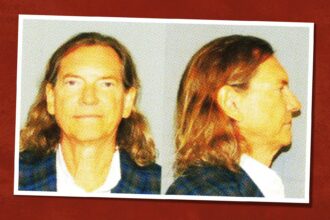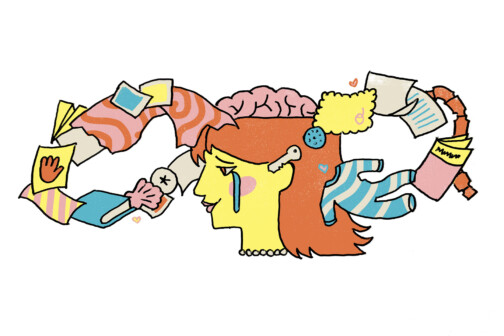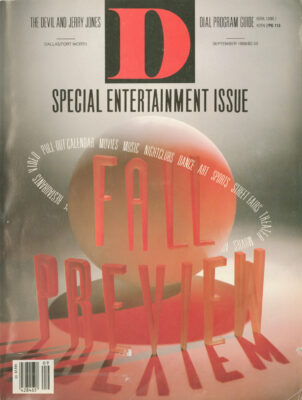After spending their honeymoon in Hong Kong last year, Dallas marketing consultants Ken Orton and Laurie Windham found themselves “mesmerized and seduced” by the opening Chinese economy The couple hatched an idea to start their own import catalogue business, Or-tech Enterprises, and made plans to attend a seminar in Beijing to learn more about doing business in China. The planned trip would take them back to Hong Kong, then to Beijing and other Chinese cities. They were in Beijing on June 4, the very day that Chinese hard-liners shocked the world by brutally suppressing the student uprising in Tiananmen Square. They recounted the trip for Chris Tucker, D’s executive editor.
Ken: We had booked a Beijing hotel that was recommended for the seminar, but based on our conversations with people in Hong Kong, they said we’d be better off staying at a Sheraton. I verified that we could get a shuttle to the hotel. The Forbidden City was closed due to its proximity to Tiananmen Square, but everything else was okay. Tour buses were going to the Great Wall and the shops were open. So we put all those pieces together and said, hell, let’s give it a shot.
Laurie: We had a normal ride from the Beijing airport to the Sheraton. After arriving at the hotel, we hired a guide and a car to take us around the city the next day. This was around five in the afternoon on Saturday, June 3, and even then they were saying things were fine. We were ready to start doing business the next day.
Ken: We had to do one other thing the next day that became pretty important. We had to confirm our outward-bound flight from Beijing to Shanghai, our next stop. In China it’s a government-run airline, and you can’t confirm over the phone like you do here. You have to confirm in person seventy-two hours in advance, and the only ticket office open on Sunday was about five blocks from Tiananmen Square. We decided we’d just have the driver take us by there the next morning.
So with that settled, we were just enjoying being there. The Sheraton was like any Sheraton in the world, like this island. We’re sitting atop the Sheraton Beijing eating this great Chinese dinner about 10:30 that night, when the real trouble was starting in the square, and we didn’t even know it. I’m convinced that nobody in the hotel knew it.
Laurie: We watched some CNN in the hotel room, but the broadcast was not going directly from the square to the hotel. It was going from the square to the satellite to the United States and back out to the dishes. Of course the Chinese people are not allowed to receive CNN. Anyway, we went to bed thinking everything was normal. Sometime dur-ing the night we got a call saying we had been sent a fax. It was our real estate agent back in Dallas telling us someone had made an offer on our house. At about eight in the morning Beijing time, Ken tried to call the realtor. I turned on the TV and started watching CNN while he was on the phone. He’s talking to the realtor and I’m watching what’s happening in the square, and I’m going, what in the hell is happening? Ken: We watched about two hours of the CNN coverage of what was happening in the square. It was unbelievable. About ten that morning they made CNN stop filming. They scrambled the signal, but they kept covering through telephone interviews. There were still an awful lot of journalists around after Gorbachev’s visit, and that’s one reason there was such heavy coverage. But when our guide showed up that morning, he had no idea what was going on. He said there was only one child injured. He was a government-approved guide assigned to the tourist service, but I think he really believed that.
Laurie: He had a driver, so we took off for the airline office. Of course there was nobody on the streets, and all the streets were blocked off by buses the students had parked to block traffic and the troops. As we approached the area of the square we could see the smoke. At one point the only way to get around the buses was to drive up on the sidewalk, so we started doing that. There was about a quarter inch of space between these two buses, and we squeezed through. The students really had the city shut down. They couldn’t get food or basic necessities in, which is one reason they brought the troops in. As we got closer to Tiananmen Square, the interesting thing was the way the people were communicating with each other. You’d come upon a little group of people, thirty or forty people all squashed close together, talking rapidly, and you’d see some frantic person running from this group to another group. The news just went zigzagging up the street. And the closer you got to the square the more pronounced the look of panic was on the people’s faces.
Ken: Our guide knew he was supposed to remain calm at all costs, but the driver was getting noticeably more tense as we got closer to the square. Then we started to see the burning vehicles and the bricks thrown in the street. We only got within about five blocks of Tiananmen, but we were on some of the main arteries where the troops came in. We saw one troop transport truck that was burned badly and several cars turned over.
Laurie: My memory of this is a little different from Ken’s, but it seemed like we had just passed this truck, and when we were about fifty feet away from it, the fire hit the gas tank and the truck exploded. It scared the hell out of us.
Ken: You know, it never occurred to us to try to go to the American Embassy or anything like that. In my mind the conflict was still confined to that one area. I don’t know.. .I guess it’s hard to realize that you’re really in a situation where law and order have broken down and things are out of control.
Laurie: I remember pulling up to the airline office and all these people just sort of milling around and looking freaked out. And all the businesses were closed down, and there was a lot of confusion about whether we were at the right place or not. We got out of the car and at that time I was really worried about our safety. You’ve got these people in a panic. You don’t really understand what their anger is about and you don’t know whether it may be directed toward something America has done to them. And if you’re an American, you can’t blend in.
Ken: This place looked like a bus terminal in Tucson in about 1950, with about 200 people trying to cram up to this one window, all waving their travel documents and yelling. I was gripping our passports really tightly because I didn’t want to lose them. That could have meant being stuck there for weeks. All the time the guide, whose name was Adam, by the way, is translating what the people around us are saying. There was a young man who was saying he was a student from outside the city, and he was in the protest. Two of his friends were killed and he had to get out of the city. He was just begging these airline people. Meanwhile the driver had been beeped several times and he was being told to get us back to the hotel because it wasn’t safe. Then someone else told our guide that several hundred people had been killed in the square last night.
Laurie: We finally got confirmed and headed back to the hotel. We asked the guide and the driver to come in and have lunch with us, and that’s when we found out they were forbidden to go into the American hotels. You know, they don’t want them exposed to the impure ways of capitalism. Then they just drove off. I remember wishing I could have said good luck or we’re sorry for what’s happening or something.
Ken: When we got back in we weren’t allowed to leave the hotel again by order of the U.S. Embassy. We just hung out at the hotel with several American tour groups and other people who were marooned- In fact, the people who had planned the conference were stuck in the same hotel. They tried to go ahead and have it, but it didn’t work out.
The next day we decided to go on to the airport several hours before our flight. I figured it would be a hurry-up-and-wait deal, but Laurie felt better waiting there for a flight instead of at the hotel. There were a lot of people who looked like their companies had ordered them to leave Beijing. You could see one shuttle bus completely loaded with computer equipment that I guess they were taking to a safer place. On our bus there was one of the most interesting people we met, this Dutch journalist who had been practically living in Tiananmen Square for weeks. He had walked to our hotel, about ten miles, and he’d been up all night. He was a mess, He be-lieved that this Dutch TV station had wired him a ticket and it was waiting for him at the airport. He’s got video cameras and his pockets, like safari pants, are stuffed with videotapes. And then. . .this was amazing. We’re on the bus and starting to breathe a little easier, and all of a sudden he looks through the trees between these two streets and sees a line of troop vehicles on the other side. So this guy convinces the bus driver to turn the bus around and go right by the troops! We’re silting there as pale as ghosts wondering how we got into all this. We just wanted to get out of town. And as if that wasn’t bad enough, he then tells the bus driver to slow down and pulls out his video camera and starts filming all these Chinese soldiers. They’re camping by the road, digging in to stay. Several of them are holding automatic weapons. I made eye contact with one of the soldiers watching the bus. We’re probably twenty feet from him, and he’s carrying a machine gun. His eyes were following the bus, like he was thinking, “what should I do?” There must have been a hundred trucks and a thousand or so troops in that spot.
Laurie: There were a couple more surprises after that. We finally got to the airport, waited for several hours, and got our boarding passes. Ironically, the boarding passes were for seats that didn’t exist on the airplane. Sorry, no row sixteen on this plane. So the flight attendant moved us to what would have been first class or business class, since they were using an American plane, but of course, it would be elitist to have different classes of service on a Chinese plane. They have the designations, but you don’t get treated any differently.
Ken: We finally made it into Shanghai, which you have to keep in mind is a city of twelve million people, one of the largest cities in the world. Of course the news has spread to Shanghai, and people are walking around looking dazed and confused. There are no cabs, no buses running. We had telexed ahead to the Sheraton in Shanghai and somebody was supposed to meet us, but with all the chaos we didn’t know if he’d been able to get through. About fifteen minutes later here comes this guy with a sign and my name on it.
The look of relief on our faces must have been incredible. We just collapsed into the cab, saying thank God we’re away from all that mess. And then the driver asks how bad it was, and we tell him. And he says, “well, I hear the troops are moving in here tonight.” We almost jumped out of the cab. We were gone before they came, but at that point, 1 would have believed anything.
Get our weekly recap
Brings new meaning to the phrase Sunday Funday. No spam, ever.
Related Articles

Local News
Bill Hutchinson Pleads Guilty to Misdemeanor Sex Crime
The Dallas real estate fun-guy will serve time under home confinement and have to register as a sex offender.
By Tim Rogers

Restaurants & Bars
The Best Japanese Restaurants in Dallas
The quality and availability of Japanese cuisine in Dallas-Fort Worth has come a long way since the 1990s.
By Nataly Keomoungkhoun and Brian Reinhart

Home & Garden
One Editor’s Musings on Love and Letting Go (Of Stuff, That Is)
Memories are fickle. Stuff is forever. Space is limited.
By Jessica Otte


